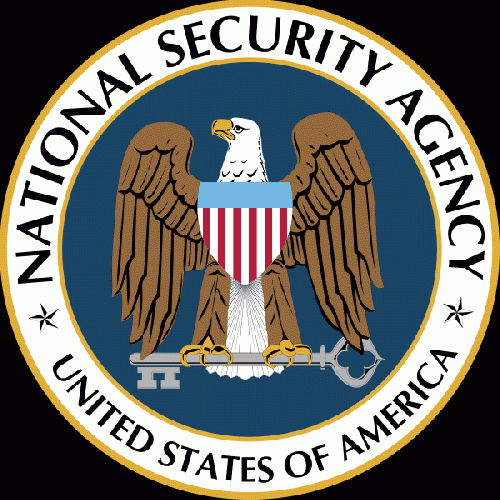
A malevolent looking eagle spying on the world?
(Image by The Office of the Director of National Intelligence, Author: U.S. government) Details Source DMCA
A malevolent looking eagle spying on the world? by The Office of the Director of National Intelligence
INSIDER INFORMATION
In the US, spying is big business. The NSA's new centre for stocking computer records at Bluffdale, Utah will cost on its own $2 billion, but the agency has a 'secret-defense' budget which, for all its cloak of secrecy, is at least five times that. It's a slush fund involving the huge defense contractors like Boeing and Lockheed-Martin, Raytheon and Endgame as well as companies like Booz Allen and Hamilton, the company whose alumni include not only the now famous whistle-blower Edward Snowden but also one Mike McDonnell, a former head of the NSA. Scarcely surprising that Booz was entrusted with so many juicy defense contracts. Because in many ways, good money can be made out of this otherwise seemingly Pharaonic collection of the world's internet browsing and email habits'.
'That which on the face of it, concerns only private lives can serve very well, the next day, in economic competition', says Franck Bulinge, author of a book on spying, based in Paris.
The fight against Al Qaeda is only an excuse for a much bigger fight - the economic one. As James Bamford has put it, terrorism merely provides "an excuse for the NSA to expand its reach and increase its power". One anonymous source in the French defence department, who had been entertained several times in the NSA's headquarters at Fort Meade, recently told the Figaro (July 5 2013) that:
'Since the fall of the Berlin Wall, in reality, the NSA has been 80% preoccupied with economic intelligence.'
Similarly, in the UK, GCHQ is specifically tasked to intercept foreign communications "in the interests of the economic well-being of the United Kingdom". GCHQ's K Division analyses targets specified by the government's Overseas Economic Intelligence Committee, the Economic Staff of the Joint Intelligence Committee, the Treasury, or the Bank of England.
After all, even before Edward Snowden there was Mark Klein, the telecommunications technician who revealed that AT&T was allowing the NSA access to vast amounts of customer data without warrants. And before that, there had been Congressional inquiries into the mass interception of civilian communications in the US and a large (multi-year) investigation by the European Parliament in 1999.
The 1975-76 Church Committee congressional hearings probed widespread intelligence abuses by the FBI, CIA, IRS and NSA. It was headed by Senator Frank Church (D-Idaho). Reporting in the shadow of the Watergate scandal, the committee revealed how under the guise of national security agencies had spied on American citizens for political purposes during the Kennedy, Johnson and Nixon administrations.
In those days, the COMINT take focussed on 'company plans, telexes, faxes, and transcribed phone calls'. All that has changed is that now, with email, the monitoring is even easier.
Forget all the talk about "crime fighting'. Return instead the 1970s when the US Foreign Intelligence Advisory Board recommended that 'henceforth economic intelligence be considered a function of the national security' and, a meeting between NSA, CIA and the Department of Commerce authorised the creation of secret new department, the 'Office of Intelligence Liaison'. Its task was to handle 'foreign intelligence' of interest to the Department of Commerce and pass on secret intercepts from the NSA to support commercial and economic interests. That meeting was on 5 May 1977. After this scandal was highlighted in a British TV programme in 1993, its name was changed to the 'Office of Executive Support'. The Guardian and Glenn Greenwald's 'revelations' are far from being 'revelations' as they put it, but are rather one more chapter in a long running saga.
Frank Church's report catapulted the National Security Agency (NSA) from the shadows of the intelligence underworld to the national stage. The hearings revealed how the NSA set up secret projects code-named "Shamrock" and "Minaret" to collect international and domestic communications.
In Project Shamrock, the major communication companies of the day -- Western Union, RCA Global and ITT World Communications -- provided the NSA access to their international message traffic, from which the NSA extracted telegrams containing the names provided to them by the FBI, CIA and other sources. The report concluded by saying that the three-decade long program "certainly appears to violate section 605 of the Communications Act of 1934 as well as the Fourth Amendment of the Constitution."
The complete failure of the Church committee to influence policy is nowhere better illustrated than by the final extension of the secret agencies' powers by good ol' President Clinton, who permanently and formally married US intelligence to commercial organisations by creating a new National Economic Council, paralleling the National Security Council. The nature of this intelligence support has been widely reported. Tips based on spying regularly flow from the Commerce Department to U.S. companies to help them win contracts overseas.
(Note: You can view every article as one long page if you sign up as an Advocate Member, or higher).






